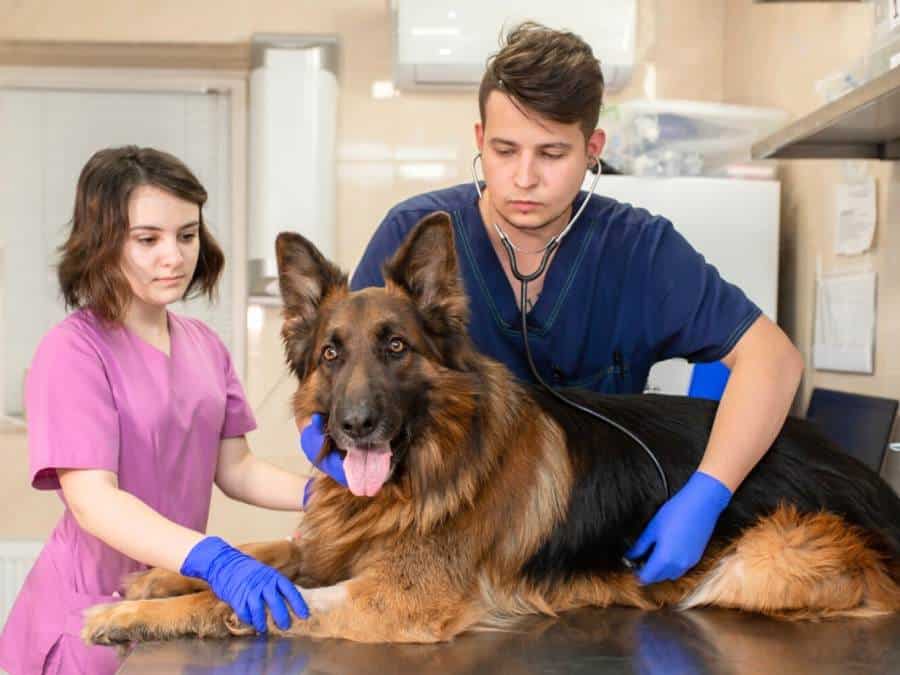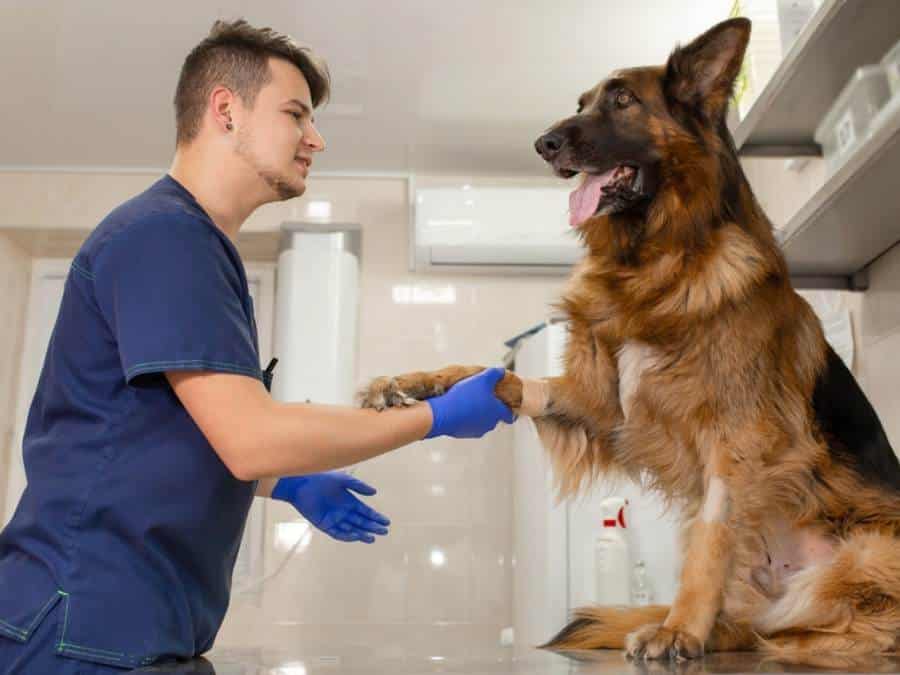Depression in German Shepherds is more common than many owners might think. Just like humans, dogs can experience periods of sadness, lethargy, and a lack of interest in activities they once enjoyed.
Recognizing the signs of depression in your furry friend is the first step toward helping them recover.
This blog post aims to shed light on German Shepherd depression, covering its symptoms, causes, and ways to help your dog bounce back to their happy, energetic self.
Do German Shepherds Get Depressed?
Yes, German Shepherds can experience depression. While they may not experience it in exactly the same way humans do, dogs can show signs of sadness and behavioral changes that suggest they are going through a period of low mood or depression.
These changes can be triggered by various factors, such as changes in their environment, the loss of a companion (either a human or another pet), changes in their routine, or health issues.
10 German Shepherd Depression Symptoms
If you suspect your German Shepherd might be experiencing depression, look for the following signs and symptoms. It’s crucial to pay attention to these changes, especially if they represent a significant shift from your dog’s normal behavior patterns:
- Change in Appetite: A decrease or increase in appetite, which might lead to weight loss or gain.
- Decreased Interest in Activities: Showing little enthusiasm for play, walks, or activities they used to enjoy.
- Increased Sleep: Sleeping more than usual or appearing lethargic during wakeful periods.
- Withdrawal: Avoiding interaction with family members and other pets, seeking solitude more often.
- Lack of Energy: Displaying low energy levels, seeming ‘flat’ or unresponsive to things that would typically excite them.
- Change in Habits: Alterations in their usual habits, such as suddenly having accidents indoors despite being house-trained.
- Pacing or Restlessness: In some cases, depression can manifest as restlessness or repetitive behaviors.
- Licking or Chewing: Excessive licking or chewing on themselves, which can be a sign of stress or anxiety.
- Vocal Changes: Less barking, howling, or whining, or alternatively, more vocalizations if it’s unusual for them.
- Changes in Body Language: Showing signs of depression through body language, such as lowered head, ears back, reduced tail wagging, or a generally subdued demeanor.
These signs can also be symptoms of medical issues, so it’s essential to consult with a veterinarian to rule out physical health problems.

What Causes Depression in German Shepherds?
Depression in German Shepherds can be triggered by various factors, often related to changes in their environment or routine, as well as their physical health. Understanding these causes can help pet owners address and, if possible, prevent the onset of depression in their pets.
Here are some common causes of depression in German Shepherds:
- Loss of a Companion: The death or absence of a family member or another pet can deeply affect dogs, leading to grief and depression. (Study)
- Changes in Environment: Moving to a new home, significant changes in the household, or even rearranging the furniture can stress some dogs.
- Changes in Routine: Dogs thrive on routine, and significant changes — such as a family member’s altered work schedule, less time for walks, or play — can lead to stress and sadness.
- Neglect or Lack of Attention: Dogs are social creatures, and a lack of social interaction or neglect can lead to feelings of loneliness and depression.
- Illness or Pain: Chronic pain, injuries, or illnesses can significantly impact a dog’s quality of life, leading to depressive symptoms as they adjust to their condition or face decreased mobility and activity.
- Fear or Trauma: Experiences of fear, abuse, or trauma can have lasting effects on a dog’s emotional well-being.
- Boredom: A lack of mental and physical stimulation can lead to boredom, which may manifest as depressive symptoms in dogs.
- Aging: Older German Shepherds may experience changes in their health, mobility, and sensory capabilities, which can affect their mood and energy levels.
- Change in Family Dynamics: The addition of a new pet or baby, or a family member moving out, can disrupt a dog’s sense of security and lead to depression.
- Seasonal Affective Disorder: Although less common, some dogs may be affected by changes in season and daylight hours, similar to seasonal affective disorder in humans.
It’s important to note that many of these causes can also lead to changes in behavior that might be mistaken for depression but are actually indicative of medical issues. Therefore, a thorough veterinary examination is crucial to rule out underlying health problems before attributing changes in behavior to depression.

Other Conditions That Can Be Confused With Depression
Depression in German Shepherds can sometimes be difficult to distinguish from other conditions because many of the symptoms overlap. GSD owners like ourselves need to be aware of these conditions to ensure their pets receive the correct diagnosis and treatment.
Here are some conditions that can exhibit symptoms similar to those of depression in German Shepherds:
- Anxiety and Stress: Dogs experiencing anxiety or stress may show changes in behavior, appetite, and activity levels similar to those seen in depression.
- Chronic Pain or Discomfort: Conditions causing chronic pain, such as arthritis, dental disease, or injury, can lead to decreased activity, changes in appetite, and withdrawal, which can mimic depressive symptoms.
- Hypothyroidism: This thyroid gland disorder can cause symptoms such as lethargy, weight gain, and changes in coat quality, which might be mistaken for depression.
- Infectious Diseases: Certain infections can lead to lethargy and decreased interest in activities, similar to depression. For example, canine distemper or parvovirus can cause symptoms that overlap with those of depression.
- Neurological Disorders: Conditions affecting the brain or nervous system, such as Canine Cognitive Dysfunction Syndrome, CCD (similar to dementia in humans) in older dogs, can result in changes in behavior, confusion, and withdrawal.
- Heart Disease: Dogs with heart disease may become lethargic and show decreased interest in exercise or play due to decreased stamina, which can be confused with depressive symptoms.
- Gastrointestinal Issues: Problems with the digestive system can lead to decreased appetite and lethargy, symptoms that are also common in depressed German Shepherds.
- Cancer: Various forms of cancer can affect a dog’s health and energy levels, leading to behaviors that might be interpreted as depression.
- Side Effects of Medications: Certain medications can cause side effects, including lethargy, changes in appetite, and behavioral changes, which could be mistaken for depression.
- Environmental Changes: While not a medical condition, significant changes in a dog’s environment or routine can lead to stress and anxiety, which may present similarly to depression.
Due to the broad range of conditions that can mimic depression, it’s crucial to consult with a veterinarian if you notice any changes in your dog’s behavior, appetite, or energy levels.
How to Treat Depression in Your German Shepherd?
Treating depression in German Shepherds involves a combination of strategies aimed at improving their overall well-being, alleviating symptoms, and addressing the underlying causes of their depression. Here are several steps you can take to help a dog experiencing depression:
1. Veterinary Consultation
- Rule Out Medical Issues: Begin with a thorough veterinary examination to rule out physical health problems that could be causing symptoms similar to depression.
- Professional Advice: Your vet may offer specific recommendations or treatments based on their findings, including dietary adjustments or medication for underlying health conditions.
2. Increase Exercise and Activity
- Regular Exercise: Boost your dog’s mood with regular walks, play sessions, and physical activities that suit their health and age.
- Mental Stimulation: Use puzzle toys, training sessions, and new activities to engage their mind and prevent boredom.
3. Improve Social Interactions
- Socialization: Allow your German Shepherd to interact with other dogs through playdates, dog parks, or social walks to enhance their social life.
- Quality Time: Spend more quality time with your dog, offering affection and attention to strengthen your bond.
4. Establish a Routine
- Consistent Schedule: Dogs thrive on routine. Establishing a consistent daily schedule for meals, walks, and bedtime can provide a sense of security and normalcy.
5. Consider Dietary Changes
- Balanced Diet: Ensure your German Shepherd is receiving a nutritious, balanced diet that meets their specific health needs.
- Supplements: Discuss with your vet if dietary supplements might help. For example, omega-3 fatty acids have been shown to support mood and cognitive health.
6. Create a Stimulating Environment
- New Toys and Games: Introduce new toys and games to keep your German Shepherd engaged and entertained.
- Environmental Enrichment: Make your home more stimulating with interactive toys, comfortable resting areas, and safe access to outdoor spaces.
7. Behavioral Therapy and Training
- Professional Help: A professional dog trainer or animal behaviorist can offer strategies to modify negative behaviors and encourage positive ones, helping to alleviate symptoms of depression.
- Positive Reinforcement: Use positive reinforcement techniques to reward desired behaviors, enhancing your dog’s self-esteem and engagement.
8. Medication (if necessary)
- Antidepressants: In severe cases, and under strict veterinary supervision, medication may be prescribed to help manage depression, especially if behavioral changes and environmental improvements do not suffice.
Recovery from depression can take time. Be patient and continue offering support and love to your dog throughout the process.
Keep a close eye on your German Shepherd’s behavior and mood, and maintain regular check-ups with your vet to adjust the treatment plan as needed.
Every dog is unique, and what works for one may not work for another. It’s essential to tailor the approach based on your German Shepherd’s specific needs, preferences, and personality.
RELATED: Common German Shepherd Health Issues

When to See a Vet
Here are some signs and situations when you should consider seeking professional veterinary advice for your German Shepherd’s depressive symptoms:
- Persistent Symptoms: Signs of depression lasting more than two weeks.
- Sudden Behavioral Changes: Unexplained, rapid shifts in mood or behavior.
- Eating or Drinking Changes: Notable increase or decrease in appetite or water intake.
- Disinterest in Exercise: Reduced enthusiasm for physical activity they once enjoyed.
- Aggression or Withdrawal: New aggression or avoidance of social interaction.
- Unexplained Physical Symptoms: Lethargy, excessive sleeping, or grooming without a clear cause.
- Lack of Improvement: No change after trying home remedies for depression.
- Possible Medical Issues: Suspicion of underlying health problems contributing to depressive symptoms.
A veterinarian can help by conducting a thorough examination, which may include blood tests and other diagnostics, to rule out physical health problems. They can also provide advice on managing your German Shepherd’s depression, which might include environmental modifications, dietary changes, exercise recommendations, behavioral therapy, or, in some cases, medication.
Treating German Shepherd Depression With Medication
As with the majority of behavioral concerns in dogs, medications for your GSD’s depression are usually beneficial when combined with behavioral modification, supplements, and pheromone products.
Depending on your German Shepherd’s symptoms and the severity of the depression, your vet may prescribe antidepressant or anti-anxiety medication.
Common medications prescribed for this purpose may include:
- Fluoxetine (Prozac)
- Paroxetine (Paxil)
- Trazodone
- Clomipramine (Anafranil)
- Amitriptyline (Elavil)
- Diazepam (Valium)
- Alprazolam (Xanax)
Get a behavioral and physical health assessment before giving medication to your pup. Do not give human medications to your dog, and always consult your veterinarian before starting your dog on medication.
How to Prevent Depression in Your German Shepherd?
Here are some strategies to help keep your dog happy and mentally healthy:
- Regular Exercise: Engage your GSD in daily physical activities suited to their age and health status to stimulate their body and mind.
- Mental Stimulation: Use puzzle toys, training sessions, and games to challenge their brain and prevent boredom.
- Consistent Routine: Establish a predictable routine for meals, walks, and playtime to give your dog a sense of security.
- Quality Time: Spend quality time with your German Shepherd every day, offering affection and attention to strengthen your bond.
- Healthy Diet: Provide a balanced diet with all the necessary nutrients to support your German Shepherd’s overall health.
- Socialization: Encourage positive interactions with other dogs and people to enhance their social skills and reduce anxiety.
- Environmental Enrichment: Keep your dog’s environment engaging with toys, comfortable resting areas, and safe spaces for exploration.
- Regular Vet Check-ups: Ensure your dog has regular veterinary check-ups to monitor their health and catch any issues early.
- Address Changes Quickly: Be attentive to changes in your household or routine that may affect your dog, and take steps to help them adjust smoothly.
- Train and Educate: Invest in training and behavioral education to build their confidence and reduce fear-based behaviors.
By implementing these preventative measures, you can significantly reduce the risk of depression in your dog and enhance their quality of life.
Closing Thoughts
German Shepherd depression is a serious but manageable condition that requires awareness and proactive care from dog owners. Recognizing the signs, understanding the causes, and knowing how to respond are crucial steps in supporting your dog’s mental health.
Whether it involves seeking professional help, making lifestyle adjustments, or simply spending more quality time together, the effort you put into addressing depression can make a world of difference in your pet’s life.




